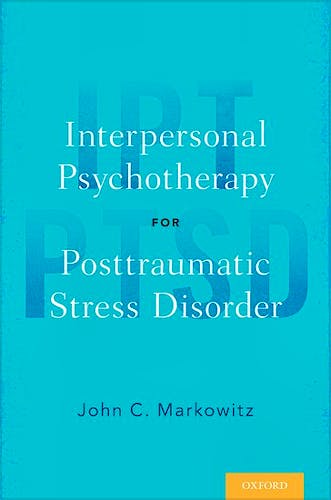

No hay productos en el carrito



Interpersonal Psychotherapy for Posttraumatic Stress Disorder
Markowitz, J.
1ª Edición Septiembre 2016
Inglés
Tapa blanda
184 pags
600 gr
null x null x null cm
ISBN 9780190465599
Editorial OXFORD
LIBRO IMPRESO
-5%
73,06 €69,41 €IVA incluido
70,25 €66,74 €IVA no incluido
Recíbelo en un plazo de
2 - 3 semanas
Description
Posttraumatic stress disorder (PTSD) is a prevalent, debilitating public health problem. Cognitive behavioral therapies (CBTs), and specifically exposure-based therapy, have long dominated PTSD treatment.Empirically supported treatments-Prolonged Exposure (PE), Cognitive Processing Therapy, Eye Movement Desensitization and Reprocessing (EMDR), and virtual reality therapy-all have relied upon the "fearextinction model" of exposing patients to reminders of their trauma until they grow accustomed to and extinguish the fear. While exposure-based treatments work, they (like all treatments) have their limits. Manypatients refuse to undergo them or drop out of treatment prematurely; others may actually worsen in such treatment; and still others simply do not benefit from them.
Interpersonal Psychotherapy for Posttraumatic Stress Disorder describes a novel approach that has the potential to transform the psychological treatment of PTSD. Drawing on exciting new clinical researchfindings, this book provides a new, less threatening treatment option for the many patients and therapists who find exposure-based treatments grueling. Interpersonal Psychotherapy (IPT) for PTSD was tested in a randomized controlled trial that compared three psychotherapies. Dr. Markowitz and his group found that IPT was essentially just as effective as exposure-based Prolonged Exposure. IPT had higher responserates and lower dropout rates than did PE, particularly for patients who were also suffering from major depression. These novel findings suggest that patients need not undergo exposure to recover fromPTSD. Interpersonal Psychotherapy for Posttraumatic Stress Disorder describes an exciting alternative therapy for PTSD, details the results of the study, and provides an IPT treatment manual for PTSD.
Table of contents
Acknowledgments
Introduction
Chapter 1: Is exposure therapy necessary to treat PTSD?
Chapter 2: The target diagnosis: PTSD
Chapter 3: A Pocket Guide to IPT
Chapter 4: Adapting IPT for PTSD
Chapter 5: IPT for PTSD - Initial Phase
Chapter 6: IPT for PTSD - Middle Phase
Chapter 7: IPT for PTSD - Role Transitions
Chapter 8: IPT for PTSD - Grief
Chapter 9: IPT for PTSD - Role Dispute
Chapter 10: IPT for PTSD - Termination Phase and Maintenance
Chapter 11: Difficult situations and special circumstances
Chapter 12: Practical Issues
Chapter 13: Training in IPT (for PTSD)
Chapter 14: Conclusion: Where do we go from here?
Appendix: Patient Handout
References
About the Author
Index
© 2026 Axón Librería S.L.
2.149.0